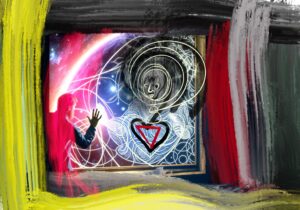The Long Road To The Ego’s Spiritual Submission
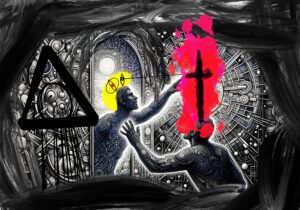
What is your concept of God
And does it really matter?
Or is your concept that there is no God at all?
Do you believe that the world just appeared from nothing?
Or if you’re a big bang person,
Did that bang have no source?
No creator?
Did it just suddenly happen from a mix of space gas?
Alternatively, do you believe in a creator?
Do you call him God?
Is God a white-bearded giant hanging out in the clouds, looking over us like a judgmental father allowing the world to descend into mayhem?
Or is he consciousness itself,
Ever-present and unchanging,
Like a field of light that is simultaneously beyond light,
Out of which everything arises?
When people say, “I don’t believe in ‘God’ but I’m spiritual,”
What do they mean?
Are they reducing God to a two-dimensional concept
And removing him from all of creation to protect their ability to not believe in him?
Or do they just like the word “spiritual”
More than the word “God”?
And beyond any of those questions,
Does it really matter what we believe?
Does it affect our life positively or negatively?
Or is belief only around to get us past the velvet rope of heaven in the afterlife?
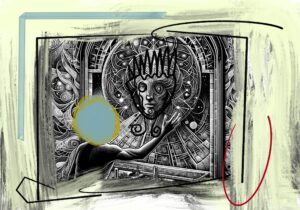
2
## Engaging with Atheism
A conversation with an Atheist
These questions are floating in my mind due to a recent conversation I had with a good friend who took aversion to me bringing up God casually through the day.
She said,
“There you go with ‘God’ again.”
She said she didn’t believe in God and thought it was all nonsense.
I assumed it meant she was an atheist.
And I asked her if she believed
That all of life,
The good, the bad, and the ugly,
Every song ever sung,
All the stars and the oceans,
Every flower, every being,
Big bangs and science,
Or if you’re an evolution person,
Then the soup of cells that started the evolution train,
Every bird, every monkey,
Every bit of lightning that ever flashed in the sky,
Every sunrise or snowstorm,
Every smile or laugh or cry from every child throughout time,
Every poem or painting,
Every heart that ever beat,
Running barefoot on grass,
And the sensations pricking those feet,
Did it all come from nothing?
Did this gigantic something
(However it found this form)
Really arise from nothing?
I was trying to illustrate that though it’s anyone’s right to believe in whatever they want,
That atheism isn’t exactly the rational belief system it portends to be.
And just to be clear, atheism doesn’t offend me or send me into a tailspin of judgment and condemnation.
It’s more just to point out that the cloak of rationality, which I think many atheists assume, doesn’t really fit.
When we consider the problem of the origin of life and all of existence,
I mean, here we are in this wild world,
Which either came out of something
Or out of nothing.
It would be like walking into an empty room,
With giant white walls,
And seeing a painting on the wall.
Which would be the rational assessment to make on how it got there?
A) That it suddenly just appeared there from particles randomly floating around,
Which themselves just appeared from nothing as well.
Or
B) That someone painted it,
And then later found a hammer and a nail,
And hung it there?
Just on the level of rationality,
I think most would assess that choice B is probably what happened.
She then brought up the white-bearded guy in the sky and fake church people being cosmic beggars while living lives riddled in hypocrisy,
Which is why she despised religion and rejected the concept of God.
So, I went on to clarify that that was not at all what I was talking about when I would casually bring up God in conversation.
And I realized that the idea of God needs investigation and clarification,
As it is so mired by so much in our topsy-turvy minds and the dirt of the world,
And indeed by countless charlatans who use God to justify their crimes.
Language itself often can only hint at things,
Brushed against its own limitations,
And misinterpretations.
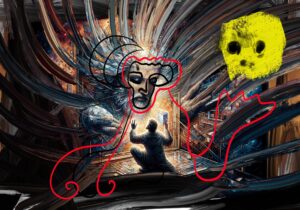
3
## Personal Interpretations and Understanding
For me, God is consciousness itself,
And the overwhelming reality we are all immersed in.
If you want to assume that the field of consciousness that all of life is dancing in,
And all your thought forms are falling in,
Is a guy with a white beard in the sky,
Then far be it for me to criticize the workings of your mind.
But for me, that’s a rather limiting and silly concept.
Likewise, if you want to reduce God to the Bible,
And churches full of emotional people living hypocritical lives,
Again, that’s fine with me.
But understand then that when I talk about God,
And when you talk about God,
We are not talking about the same thing.
And if those limited concepts are so-called houses you keep God in,
Then the primary shame of it is from perspective.
You are limiting yourself to the greatest joy life has to offer.
Cultivating and caring for your relationship with your creator,
You are potentially missing out on the greatest lifelong conversation that he is trying to have with you.
Personally, I wouldn’t dare judge you,
Or condemn you,
Or pretend I know where you’re gonna go or not in the afterlife.
I’ve got no idea and won’t pretend to know.
But I will think you are missing out.
Because with the weight of the gift of our existence,
I sense an underlying challenge or question
That our limited time seems to ask:
What’s it all for?
And what are we here to discover?
And if you say we’re here to just be,
To just experience life and it need not go deeper,
I would say,
How’s that working out for you?
Do you have peace?
Do you radiate joy?
Or are you stressed and full of fear,
Trapped in patterns of behavior that keep you deeply unsatisfied?
Do you really love,
Or is love just a word that you throw out like wishful thinking, an ideal you hope to one day find and fulfill?
And if you get the sense that your life isn’t all that it should be,
From where does that feeling arise,
Or feelings of guilt and even shame?
Or even, where does our internal morality come from?
To me,
We are always being called home by consciousness itself,
Or by God.
And we are challenged to know him,
And in that knowing to know ourselves,
And to realize our potential and our purpose,
Which will never blossom from fearful activity,
But from a place of peace and faith.
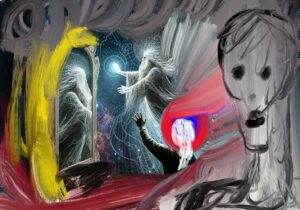
4
## Seeking Inner Truth and Connection
Seek first the father and all else will be added on.
What does that mean?
For me, it means rather than focusing on the external objects of life,
The people and the dramas,
Current circumstances and issues,
We move our focus within.
And we reside in presence over and over again.
And in that field of consciousness,
Like children, we play with the power of our imagination and get to create life proactively with our creator,
Who is consciousness,
Or the great I am.
Before Abraham was,
I am.
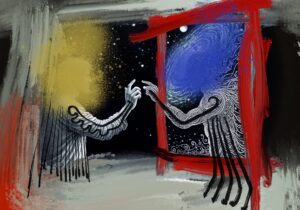
5
### Interpreting a Profound Biblical Moment
Jesus said to them, “Truly, truly, I say to you, before Abraham was, I am.” So they picked up stones to throw at him, but Jesus hid himself and went out of the temple.
Notice he didn’t say,
Before Abraham was I was,
But said before Abraham was,
I am.
Because I am,
Or the eternal now,
The unchanging reality we all ultimately live in,
As the externals constantly change.
But change against what?
They change against the changeless.
The changeless is what we are,
And when we seek the father,
It is the changeless that we seek.
And we already are that and in that, so to seek it seems strange,
Yet our minds or our egos do require that direction,
As they habitually focus on the changing aspects of the world and the predicament of life they feel trapped in.
Unlimited beings imagining being infinitely limited things.
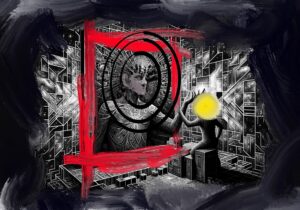
6
### The Human Tendency to Resist Divine Truth
The reaction they had to Jesus strikes me as sadly funny.
Because it is just like humans to react this way,
To throw stones,
Or to violently react to someone pointing out the reality of God,
Of I am,
Of consciousness,
Of presence,
Or of the overwhelming and undeniable reality of our situation,
Which for whatever reason,
People since time immemorial can’t help but deny.
And why is that?
Why the violent reaction?
It points to the battle we are all in.

7
### The Ego’s Struggle and Spiritual Submission
The ego is a stubborn entity;
It wants to be the alpha and omega.
It doesn’t want to submit and hates when the inevitability of its submission stares it directly in the face.
When Jesus said,
Before Abraham was I am,
He had no ego,
But they took him as an ego,
And maybe deep down they recognized,
He was beyond ego,
Which was literally a deadly threat to their egos.
So of course, stones get thrown,
And the reality of a hammer, some nails, and a cross gets born.

8
### The Spiritual Journey Beyond Ego
This is the birthplace of Satan himself;
Satan refused to submit is all.
He refused to allow his ego to die,
Which is the price of admission to enter the kingdom of heaven.
And I personally believe also the space where people who say, “I’m ‘spiritual’ but I don’t believe in God,” are trying to occupy.
But I suspect that much of so-called spirituality is rooted in self-development, which can easily veer off into self-aggrandizement.
And just to be clear,
I practice yoga daily and cold plunge and biohack up there with the best of them, so I’m not condemning so-called “spiritual” practices which Christians will often look at with sideways eyes.
But I do see both sides.
Because in my view, where Christianity gets it really right,
Is in the need to submit and surrender to a power greater than ourselves.
To acknowledge,
Before Abraham was, I am.
I am is the principal reality of all existence,
Including the reality our little egos are dancing in.
And all of self-improvement or self-empowerment is only as good as a way to bring us into our ability to seek the father.
To submit our will and our ideas of self to the overarching presence that is God.
To call him God then becomes important,
In that it points to this:
The ego submitting to a power greater than itself.
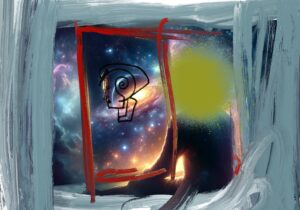
9
### The Paradox of Ego and Divine Creativity
The ego is funny in a way,
Because when it believes itself to be the ultimate power,
It works against itself,
By the overwhelming weight of a false belief.
The busy mind trying to come up with ideas,
Or actions resulting from fear and insecurity,
Are in effect drowning itself in a noise that prevents the revelations that come from God,
Or the source of actual genius.
It is then through our submission to God that our greatest potential is realized.
By eliminating the self,
The authentic self emerges,
The self of no self, as it were.
The function of a busy mind to create works of art, music, poetry, or true innovation in any realm is extremely limited or maybe even nonexistent.
Shakespeare didn’t think his way into the stories he shared but rather channeled them from the divine.
And that unlimited creative potential resides in us all, as much as we can quiet the noise of our minds and go beyond it.
So the ego, in awe of itself,
Locks itself away in a room of infinitely small potential,
Compared to just right outside (or deeper inside), in the realms of surrender.
And here is where I think belief and faith matter in the realms of our potential and ability to realize it.
Ironically, it’s within the death of the ego,
Where the ego’s imagined rewards are much more likely to arrive.
And in that space of no self,
Extreme confidence in the self is realized, along with the fearlessness that innovation requires.
(Contradictory, I know.)
When you are in a room alone without God, for instance (impossible, but for the sake of argument),
Then it is only you and the fear-based judgment of the world,
Only the limited (at best) power of your own will and mind,
And the noisy chatter of thought,
Guiding you to make something that transcends all that has come before and is rooted in fearlessness? Good luck with that.
It would be like trying to paint a masterpiece but giving yourself only three crayons to work with.
As opposed to arriving at the place of no thought,
Sitting in presence as direct lines of communion are ever more increasingly opening between you and the revelations of God.
Those flashes of deep and significant insight that come from realms beyond your own mind,
Mixed with being in the presence of the ultimate reality which lends to a carefree confidence and freedom that no man’s judgments are any of your concern.
This leads to absolute fearlessness,
And ironically, extreme self-confidence which reflects the confidence or the faith you have in God.
From which vantage point, it would seem that you could light the world ablaze with your creation? Or a creation you participated in,
A creation that came through you rather than from you?
And I say this not to descend back into the ego’s framework of reality, which is highly concerned with the perception of others,
But to point out the fact that what the ego actually wants is on the other side of his or her submission.
